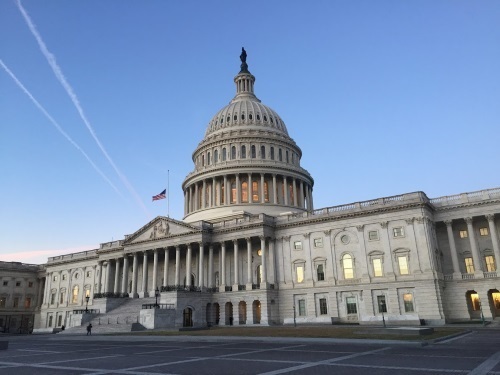The House of Representatives Select Committee on the Climate Crisis unveiled a broad 547-page plan on June 30 that includes among its recommendations that Congress fund a “massive expansion of public transit” and “further examine” switching to a vehicle miles traveled (VMT) or similarly styled fee in lieu of motor fuel taxes.
“One area that the majority staff for the Select Committee did not tackle but remains important for Congress to discuss is the issue of the viability and equity of current revenue streams for highway and transit, including the gasoline tax,” the report noted. “Congress should continue to explore and test options for alternatives that fund U.S. transportation infrastructure priorities while advancing environmental and climate priorities, such as a vehicle miles traveled fee.”
The committee’s plan also suggested “at least” doubling annual funding for new intercity passenger rail and bus rapid transit projects.
“Transit projects that reduce air pollution and improve mobility in environmental justice communities and underserved rural areas should receive additional funds and consideration,” the report said. “Federal support for projects should be conditioned on recipients meeting strong labor standards – including Buy America and Davis-Bacon prevailing wage requirements – complying with all labor, environmental, and civil rights statutes, and signing community benefit agreements and project labor agreements, where relevant.”
The overarching goals of the committee’s wide-ranging climate plan including reaching “net-zero” carbon dioxide or CO2 emissions before 2050, with interim steps including the reduction of U.S. greenhouse gas (GHG) emissions by at least 37 percent below 2010 levels in 2030 and 88 percent below 2010 levels in 2050.
Every sector of the nation’s economy would be affected by the plan, from the energy industry – where “rapid deployment” of more wind, solar, and other “zero-carbon” power sources would occur – to the construction segment, which, among other mandates, would be required to develop and use more “direct capture” and low-carbon building materials.
The committee’s report describes the transportation sector as the “largest source” of energy-related CO2 emissions in the country – accounting for 37 percent of all emissions in 2019 – and targets it for major changes.
“Congress needs to take a multi-pronged approach to the transportation sector to drive down emissions and increase the sector’s resilience in the face of worsening climate impacts,” the report said. “Improving a vehicle’s efficiency, for example, will not be enough if that vehicle travels farther each year.”
To that end, it recommends enacting a “suite” of new federal transportation policies that could impact state departments of transportation, including:
- Deploying “demand-pull” and “supply-push” policies that incorporate: a national zero-emission vehicle sales standard; federal procurement requirements; consumer tax incentives to defray upfront vehicle costs; and tax incentives, grants, and other financial tools to help cities, states, and other entities to install electric charging stations and other zero-emission fueling infrastructure.
- Require states and Metropolitan Planning Organizations (MPOs) to include GHG emissions reductions in their long-range public transit and highway planning efforts.
- Direct states and MPOs to evaluate how well the nation’s transportation system is “facilitating access” to housing, jobs, and critical services. With the counsel of outside experts, it recommends that the U.S. Department of Transportation “develop standards and criteria” for how to measure access, including a consideration for how access might differ for low-income communities and communities of color.
- Require states to use “complete streets” and “context-sensitive principles” when designing and implementing transportation projects and provide grant funding to support associated infrastructure investment.
- Increase funding for the Low-No Grant Program “by at least tenfold” and limit grants to zero-emission buses and associated equipment.
- Increase funding for USDOT programs to support passenger ferry electrification and installation of necessary shore-side charging infrastructure.
- Create a new formula and grant program managed by the USDOT to protect vulnerable transportation assets in advance of disasters, including investing in evacuation routes and increasing resilience to flooding, wildfire, erosion, and extreme weather.
- Allow states to use funds apportioned under the National Highway Performance Program for projects to mitigate the risk of recurring damage from extreme weather, flooding, and other natural disasters on transportation infrastructure.

